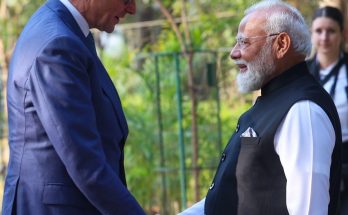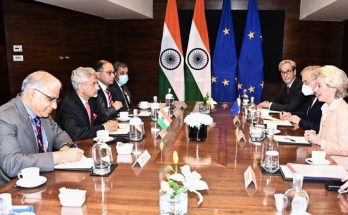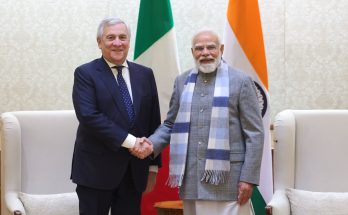 In assessing Prime Minister Manmohan Singh’s visit to Indonesia last week, a purely diplomatic approach would not do. A holistic perspective is essential to appreciate a special relationship, one imbued with a rich legacy and a promising future.
In assessing Prime Minister Manmohan Singh’s visit to Indonesia last week, a purely diplomatic approach would not do. A holistic perspective is essential to appreciate a special relationship, one imbued with a rich legacy and a promising future.
From Valmiki to Shahrukh Khan
From my vantage position in the banquet hall of the Isthana Negara in Jakarta, I heard with rapt attention as President Yudhoyono delivered an exceptionally well-crafted speech. While admiring India’s economic growth, democracy and development, he hailed the nation as ‘the master of technology.’ The broadening agenda of cooperation was mentioned. Then, breaking the barrier of formality, he went on to list six exceptional Indians who had left a deep imprint on the relationship. He paid homage to Valmiki and Veda Vyasa whose epics – Ramayana and Mahabharata – ‘inspired us.’ He offered a tribute to Mahatma Gandhi and Rabindranath Tagore – ‘our great teachers’ – and also to Biju Patnaik who, through his daring exploits to help leaders of the Indonesian freedom struggle, won recognition as ‘Bhumiputra.’ And the sixth Indian? The president noted Shah Rukh Khan as ‘a revered name.’ He stressed India enjoyed ‘a special place in the hearts of Indonesian people.’
The banquet hall, filled to the brim with Indonesia’s power elite and the Indian prime minister’s delegation, echoed with the president’s words. Prime Minister Singh began his speech by saying disarmingly that he could not match the host’s eloquence. But he, too, captured the essence of the relationship by pinpointing the two nations’ shared belief in the philosophy of ‘Bhinneka Tunggal Ika’ or ‘Unity in Diversity.’
Times have changed. Attending another presidential banquet at the same venue, I had watched President Suharto and Mrs Suharto interacting with Prime Minister Rajiv Gandhi and Mrs Sonia Gandhi in October 1986. The seeds sown then have now blossomed into a full harvest called ‘Look East Policy.’
Why Indonesia Matters
A polity transformed within a generation, Indonesia is now playing a role commensurate with its status as the fourth largest country, a nation with the largest Muslim population, a thriving democracy strategically located in the Indian Ocean and Indo-Pacific region. It is a country that seeks to lead the ASEAN without dominating it, demonstrating an instinct for a balanced relationship with other Asia-Pacific powers such as the US, China, India, Japan, Australia and South Korea.
No one has interpreted better the true nature of India-Indonesia relations than Rabindranath Tagore who visited the archipelago in 1927. He movingly opened his famous poem ‘To Java’:
In a dim, distant, unrecorded age
We had met, thou and I, –
When my speech became entangled in thine
And my life in thy life
He spoke about journeys by ‘our ancestors’ that resulted in the two lands becoming ‘companion souls.’ Citing the tragic divide created by colonialism, he urged a thorough renewal of age-old ties:
That old that has been lost, to be regained and made new
Successive leaders of the two nations – from Sukarno to Yudhoyono and from Jawaharlal Nehru to Manmohan Singh – have striven to achieve that goal. The result: the relationship is moving rapidly on an upward trajectory.
Five Pillars
 Strategic partnership, now eight years old, stands on five pillars. ‘Strategic Engagement’ would entail annual summits of leaders and regular meetings of key ministers. It will also encompass regular exchanges between the two parliaments and other important institutions dealing with space and anti-corruption work. ‘Defence and Security Cooperation’ would be further strengthened, covering maritime security and counter-terrorism cooperation in particular.
Strategic partnership, now eight years old, stands on five pillars. ‘Strategic Engagement’ would entail annual summits of leaders and regular meetings of key ministers. It will also encompass regular exchanges between the two parliaments and other important institutions dealing with space and anti-corruption work. ‘Defence and Security Cooperation’ would be further strengthened, covering maritime security and counter-terrorism cooperation in particular.
The third pillar, ‘Comprehensive Economic Partnership’, though gaining substance, is still rated as a weak one. Bilateral trade, growing well, is on track to hit the target of $25 billion in 2015. But investment flows need improvement. President Yudhoyono cited the official, but inaccurate, figure of $78 million as total value of India’s investments in Indonesia. It came as a rude shock. My inquiries indicate cumulative value to be in the range of $10-15 billion, if third country sources are factored in. India Inc should gear up and the governments need to help it get there. Further, Indonesia Inc must play its part; our prime minister rightly urged it to enhance its investment in India’s growth story. Summit level discussions established considerable potential for cooperation in diverse areas like food security, connectivity and health care.
‘Cultural and People-to-People Links’ have been gaining in salience as the fourth pillar. Indonesia’s interest in supporting Nalanda University project was especially welcome. A special cultural affinity has sustained relation over the decades. The genres of expression may have changed, but the sense of bonding remains strong. Honouring Rajiv Gandhi in 1986, the presidential orchestra had played Saare Jahan Se Achchha, sending his delegation into raptures. Last week, Indonesian singers presented kuch kuch hota hai, a blockbuster Bollywood lyric!
In an important step to map out intellectual discourse between the two countries, the Indian Council of World Affairs, New Delhi, did its bit by signing an MoU of cooperation on scholarly exchanges with the Indonesian Council on World Affairs, Jakarta. Finally, the fifth pillar – ‘Cooperation in Responding to Common Challenges’ offers immense opportunities. By working together closely, the two nations will strengthen the region’s institutions.
The two governments seem to be doing what they can, but they are also on the lookout for fresh ideas. Eminent Persons Group will be operationalised shortly. Its recommendations will be awaited with much interest in India, Indonesia and beyond.
(A former ambassador, the author is Director General of Indian Council of World Affairs. The views are personal).
Author Profile
Latest entries
 DiplomacyJuly 11, 2014The BRICS journey: Scoring high in Fortaleza
DiplomacyJuly 11, 2014The BRICS journey: Scoring high in Fortaleza China ConnectJune 9, 2014India’s options: Peace and Conflict in East Asia
China ConnectJune 9, 2014India’s options: Peace and Conflict in East Asia India and the WorldOctober 15, 2013Indonesia and India: ‘Companion Souls’ as Strategic Partners
India and the WorldOctober 15, 2013Indonesia and India: ‘Companion Souls’ as Strategic Partners China ConnectSeptember 5, 2013It’s time to alter perception of India and China as rivals
China ConnectSeptember 5, 2013It’s time to alter perception of India and China as rivals






